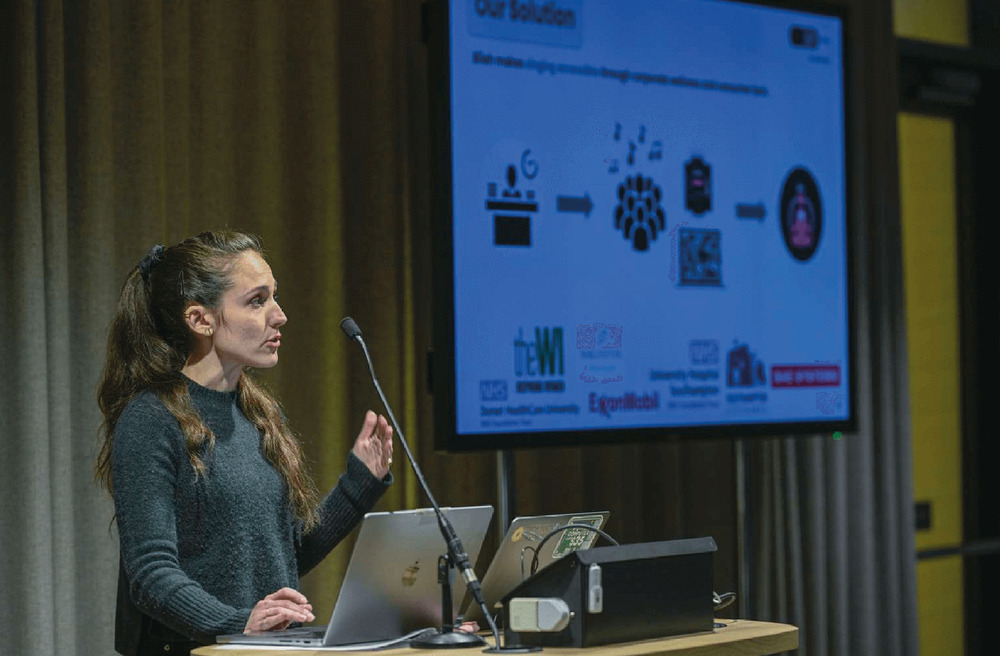Singing feels great, but did you know that it has also been found to reduce stress and improve mood [1, 2]? The human singing voice has been a subject of investigation for many decades, but it is only over the last 20 years or so that researchers have begun to investigate the health and well-being effects of singing, particularly for amateur singers [3]. In this post we introduce some studies to convince you that singing is good for your mental health!
Beyond listening
Unlike music listening, active music making, such as singing, places additional demands on the nervous system, through a strong coupling of perception and action; processes that are mediated by sensory, motor, and multimodal integrative regions distributed throughout the brain [4]. This means that singing can affect our biological state, for example, how our brain responds to stress or how it makes memory connections, as well as influencing our emotional and mental state.
Biological effects of singing
We know that singing stimulates the brain, but this effect on our nervous system also modulates components of our immune system, not just influencing our mood state but potentially having a meaningful and long-term effect on recovery from serious illness. In a study examining the effect of group singing on people being treated for cancer and their carers [5], a single hour of singing was associated with positive changes in biological markers such as a decrease in the stress hormone cortisol, beta-endorphin and oxytocin and a general activation of the cytokine network which supports our immune system.
Whilst singing has been found to change levels of stress hormones such as cortisol, cortisone and progesterone, the effect depends in part on the singing context. Singing in public can be stressful for both amateur and professional singers (see What Shapes our Singing Fears). A controlled study of a singing group comparing a ‘low stress’ performance (singing without an audience) to a ‘high stress’ scenario (live in front of a paying audience) reported effects in both directions [6]. The low-stress singing condition without an audience showed decreases in levels of the stress hormones cortisol and cortisone of members of the group, while the high-stress singing condition showed increases in both. The group was made up of professional singers, showing that even singers with experience of live performance can feel anxiety singing in public, yet still benefit from decreased stress levels when singing in a low stress environment.
Promoting positive feelings
The reported effects of singing are not just biological, in the study mentioned earlier of people being treated for cancer [5], singing sessions were linked to an increase in mood, particularly for participants who were assessed as having lower mental wellbeing at the start of the study. Similarly, participants with higher levels of stress experienced the greatest changes during singing. Another study exploring mental wellbeing and health amongst amateur choral singers also found that the effects of singing were greatest for the members who were experiencing reduced mental wellbeing in their personal lives [2]. Participants felt that singing enabled them to process, counteract or even reverse negative feelings, for example at times of personal difficulty, such as bereavement. Another study found a link between singing in a choir and self-esteem, in particular for members who didn’t have previous musical education [7].
Singing for Mental Health
The Manchester Mental Health Choir @BeeVocal was established in collaboration with the community interest company Triple C as a creative release for people experiencing mental health challenges. Online singing workshops are open to all and no experience is required.
In an interview with the mental health organisation Heads Together, BeeVocal Co-Founder and Psychologist Laney Craig, explained that they had felt it was vital to measure scientifically whether singing had an effect on wellbeing for their members;
“We measured people’s depression, anxiety and wellbeing scores over a course of 12 weeks and we found that depression and anxiety reduced significantly.”[8]
Bee Vocal Music Director Daniel McDwyer said “It’s really special to be a part of. One of our choir members hadn’t left the house in seven years until she saw a report about BeeVocal and has since been a part of the choir. We’ve since heard so many independent stories on how being part of the choir has been a big part of people’s journeys in fighting any challenges to their mental health that they might have.” [8]
The Liverpool based community choir, iChoir, have been established for over a decade, singing for mental wellbeing. In 2019 they sang at the opening ceremony of The Community Shield, where Heads Together launched their campaign Heads Up, in partnership with The Football Association, to change the conversation on mental health. iChoir Co-Chair Olga said:
“We’re a group of people that are very empathetic and we just get together to sing and singing really does make you feel better…it’s just about giving people that community and space to feel like they can open up. People also make connections with each other and gain confidence and it’s changed a lot of peoples’ lives for the better.” [9]
Author: Dr. Sam Duffy
References
[1] Jacob, C. et al. 2009. Motivation for continuing involvement in a leisure-based choir: The lived experiences of university choir members. Journal of Occupational Science. 16, 3 (2009), 187–193.
[2] Livesey, L. et al. 2012. Benefits of choral singing for social and mental wellbeing: Qualitative findings from a cross-national survey of choir members. Journal of Public Mental Health. 11, 1 (2012), 10–26.
[3] Dingle, G.A. et al. 2019. An Agenda for Best Practice Research on Group Singing, Health, and Well-Being. Music & Science. 2, (Jan. 2019), 205920431986171.
[4] Wan, C.Y. et al. 2010. The therapeutic effects of singing in neurological disorders. Music Perception. 27, 4 (Apr. 2010), 287–295.
[5] Fancourt, D. et al. 2016. Singing modulates mood, stress, cortisol, cytokine and neuropeptide activity in cancer patients and carers. Ecancermedicalscience. 10, (2016), 1–13.
[6] Fancourt, D. et al. 2015. Low-stress and high-stress singing have contrasting effects on glucocorticoid response. Frontiers in Psychology. 6, (Sep. 2015), 1242.
[7] Einarsdottir, S.L. and Gudmundsdottir, H.R. 2016. The role of choral singing in the lives of amateur choral singers in Iceland. Music Education Research. 18, 1 (2016), 39–56.
[8] Mental health choir, BeeVocal share what it means to them to sing at the launch of Heads Up | Heads Together: https://www.headstogether.org.uk/mental-health-choir-beevocal-share-what-it-means-to-them-to-sing-at-the-launch-of-heads-up/.
[9] Olga from iChoir: How singing can be a positive force for your mental health: https://www.headstogether.org.uk/olga-from-ichoir-how-singing-can-be-a-positive-force-for-your-mental-health/








